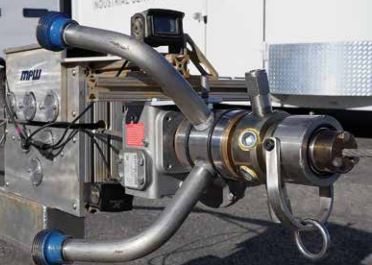The black liquor recovery boiler is a vital economic component of the pulping process, used primarily in pulp and paper applications to reclaim pulping chemicals. Within the pulping industry, maintenance of these boilers is considered especially important, as explosions, failures and incidents caused by fouling build-up in recovery boilers have led to heightened safety risks for employees and lost production time for mills.
Given the risks and limitations associated with operating and maintaining recovery boiler equipment, automated technology has been implemented in recent years to better equip millwrights with the tools they need to keep employees safe and operations online. Here is a review of the current automated technology solutions available for safe and efficient elimination of fouling associated with black liquor recovery boilers. Many of these solutions are not confined to recovery boilers and are applicable to many industries outside of the pulp and paper industry.
While working in hazardous environments, robotic tools can assist with:
- Decreasing safety- and quality-related incidents
- Eliminating the need for workers to enter potentially dangerous spaces by offering hands-free operation
- Pinpointing exact locations of obstructions and defects through the utilization of cameras
- Increasing efficiency, decreasing downtime and providing detailed and consistent monitoring
The Equipment
MPW’s cable crawler is deployed for the cleaning of not just the upper furnace but also the back pass and under the nose with the capability of reaching tough-to-reach places of entry. The cable crawler features 2-D, high-volume/high-pressure rotating heads that are driven by a servo-motor cable unit. Its ability to be pushed and pulled along the cable allows for focus on critical areas and the adjustable speeds address the toughest jobs. Used for the removal of salt cake fouling in tubes, the cable crawler can also be used in other vertical runs like the walls of the boilers and the camera mounted on the crawler gives the operator eyes on the job via a corresponding monitor.
For smelt bed services, MPW provides two options. For boilers that may not have a sloped floor, smelt pumping services are available. The smelt is suctioned from the tank and deposited into a dissolving receptacle. The second is the smelt bed wash tool. Hydraulically indexed, 2-D with a rotating head, the smelt bed wash tool is directed via a rod with tremendous flexibility so workers can knock off any smelt located in harder to reach areas.
Speaking of hard-to-reach areas, MPW has developed single- and a multiple-lance machines to conduct automated tube cleaning for Gas-Over-Tube (TAH) Air Heater jobs. Called the SAL-1 (single) and the MAL-3 (multiple), they each offer unique cleaning abilities. SAL-1 is a hand-held option and the MAL-3 can operate up to three lances at once through any kind of tube bundles. Running anywhere from 10 psi-40 psi, the hands-free MAL-3 can tackle evaporator or condenser tubes that are either horizontal or vertical. For line cleaning, MPW uses an Auto Box for cleaning green liquor lines. The Auto Box is similar to a single lance machine that is moored to a stand and features a strong air-powered lance that employees control from a safe distance. With the ability to clean up to 1,000 feet of pipe, the Auto Box is used for larger lines and with a back-out preventer, operation of the Auto Box is that much safer for the worker.
Two different models of M1-RV Remote Vacuuming machines are utilized by MPW. One has a serrated snout that can use fire blast and water nozzle hoses attached to both blast and vacuum. The second has an auger attachment that attacks the more difficult-to-extract particles like slag and hard soil. Both have the ability to climb stairs, hills or ramps. Operated from afar, the worker operates the machines with a joystick and video monitoring. Dissolving tanks are crucial to any large-scale cleaning project, which also means it requires diligent cleaning. Remote crawlers are deployed and give a unique versatility for the cleaning crew. The tanks often contain harmful substances and the crawlers nimbly maneuver in tight spaces to perform some of the true dirty work that can be dangerous for humans to conduct.
